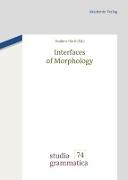| Artikelnummer | 9783050060569 |
|---|---|
| Produkttyp | Buch |
| Preis | 175,00 CHF |
| Verfügbarkeit | Lieferbar |
| Einband | Fester Einband |
| Meldetext | Folgt in ca. 10 Arbeitstagen |
| Autor | Härtl, Holden |
| Verlag | De Gruyter Akademie Forschung |
| Weight | 0,0 |
| Erscheinungsjahr | 20130515 |
| Seitenangabe | 336 |
| Sprache | ger |
| Anzahl der Bewertungen | 0 |
Interfaces of Morphology Buchkatalog
Das morphologische System als eine zentrale Komponente der menschlichen Sprachf¿gkeit organisiert eine Reihe strukturbildender Operationen und ist eng mit lexikalischer Produktivit¿als einer Kerneigen-schaft von Sprache verkn¿pft. Eine klassische Dom¿ ist die Wortbildung, die die Erzeugung lexikali-scher Einheiten leistet und damit ma¿eblich an der Pr¿ng neuer sprachlicher Konzepte und deren Speicherung beteiligt ist. Heftig diskutiert wird der Status von Morphologie in der Grammatik. Einen Kernpunkt bildet dabei die Frage nach der Autonomie morphologischer Prozesse und vor allem, ob Wortbildungsmechanismen nicht syntaktischen oder semantisch-konzeptuellen Ebenen des Sprachsystems zuzuschlagen sind. Ist es sinnvoll, von einem separaten morphologischen System auszugehen, angesichts dessen, dass viele Me-chanismen, die man traditionell der Morphologie zurechnet, systematisch Pendants in anderen Kompo-nenten des Sprachsystems aufweisen, etwa in der Syntax oder der Phonologie? Diese Fragen bilden den Hintergrund f¿r den vorliegenden Band, der eine L¿cke in der Forschung zum Thema f¿llt, indem er unterschiedliche, an morphologische Bereiche angelagerte Untersuchungen zu-sammenf¿hrt. Im Vordergrund stehen dabei Ans¿e, welche die Wechselbeziehungen unterschiedlicher grammatischer und nicht-sprachlicher Informationen im Allgemeinen und solche bei der Bildung oder Modifikation von W¿rtern und lexikalischen Einheiten im Speziellen thematisieren. Aus einem breit gef¿herten disziplin¿n Spektrum werden morpho-syntaktische, semantische, phonologische und textliche Aspekte beleuchtet, um so unter Ber¿cksichtigung ganz unterschiedlicher Gesichtspunkte aus den ver-schiedenen Bereichen der systemtheoretischen und kognitionswissenschaftlichen Linguistik, Computer-linguistik und Literaturwissenschaft zur Erforschung der Grundlage lexikalischer Kreativit¿und Flexibilit¿beizutragen. The morphological system as a core component of the language faculty organizes a number of structure-building operations and constitutes the basis of lexical productivity as a central trait of human language. Here, word-formation represents a classical domain, which decisively participates in the creation and memorization of novel concepts. What is hotly discussed is the status of morphology. The debate centers around questions about the autonomy of morphological processes and, in particular, if word-formation could, in fact, be fused with syntactic or semantic-conceptual levels of the language system. Is it reason-able to postulate a separate morphological system in view of the fact that several mechanisms which are traditionally regarded as morphological are systematically mirrored in other components of the language system such as, e.g., syntax or phonology? Against this background, the current volume fills a critical gap in the research on this topic as it brings together various perspectives on interfacing areas of morphol-ogy. The approaches focus on the interplay between different types of grammatical and non-linguistic information in general as well as on the formation and modification of words and lexical units. Morpho-syntactic, semantic, phonological as well as textual aspects are examined from a broad disciplinary spec-trum in order to contribute to an investigation of lexical creativity and flexibility from perspectives of system-theoretical and cognitive-scientific linguistics as well as computer linguistics and literary science.
175,00 CHF
Lieferbar


Dieser Artikel hat noch keine Bewertungen.